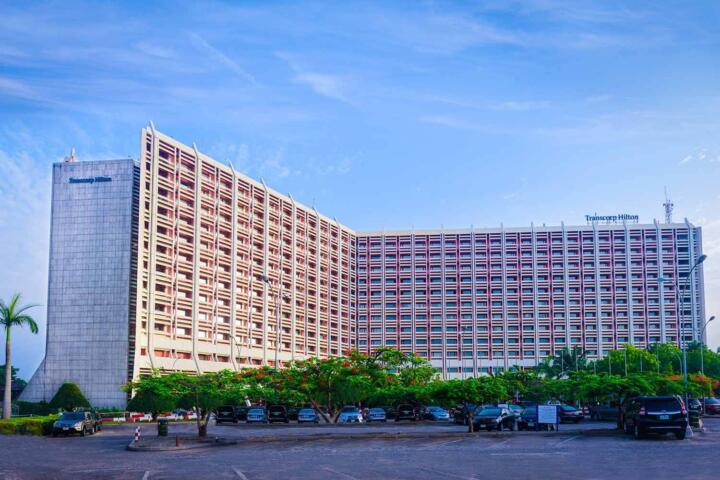Transcorp Hotels Plc has delivered an outstanding performance in the first half of the year, reporting revenue of ₦47.57 billion. This represents a substantial year‑on‑year increase that underscores the company’s strong position in Nigeria’s hospitality and events sector. Driven by a resurgent travel market and innovative leveraging of its facilities, Transcorp Hotels appears to be capitalizing on renewed demand across all segments.
Revenue growth has been broad‑based. Room sales accounted for approximately two‑thirds of the revenue mix and showed significant increases as occupancy rates rose, particularly in key properties in Abuja and Lagos. Leisure travel, domestic tourism, and business visits all contributed to a steady inflow of guests. Demand from international visitors began to recover in select city‑centre hotels, especially those located near diplomatic zones.

Food and beverage operations grew in tandem, contributing nearly 30 percent of revenue. Banqueting, catering, and in‑house restaurants collectively saw heightened patronage, fueled by more frequent corporate gatherings, conferences, and social events.
A key engine behind this performance has been the contribution of the Transcorp Centre—a newly developed 5,000‑seat multi‑purpose venue and events space. Designed to host large conferences, exhibitions, concerts, and government events, the Centre has opened up a high‑margin revenue stream and positioned Transcorp Hotels to benefit from the increased appetite for high‑profile gatherings. According to management insights, the venue has already attracted a growing list of clients hosting full‑scale events, many of which require full‑service hospitality support including accommodation and catering.
On the profitability front, gross profit for the half amounted to ₦36.21 billion, reflecting remarkable operational leverage and economies of scale. Operating expenses rose, driven by inflation, wage pressures, and an uptick in utilities and vendor fees—but Transcorp Hotels managed to absorb much of the cost increase through disciplined expense control and efficiency initiatives in energy management and procurement. Profit before tax stood at approximately ₦12.23 billion, while net profit reached ₦8.68 billion, marking a double‑digit growth in shareholder returns. Earnings per share climbed from around 65 kobo in H1 2024 to 85 kobo in the period under review.
Management’s strategy appears to be paying strong dividends. In particular, the rapid activation of the Transcorp Centre illustrates a deliberate shift toward diversifying revenue sources beyond room income. The board has emphasized integrated hospitality experiences, bundling accommodation, food services, and large‑scale event hosting into cohesive packages targeting corporate and government clients. This vertical integration has not only boosted yield per client but also smoothed revenue volatility tied to room occupancy cycles.
To reward shareholders, the company declared an interim dividend of 10 kobo per share, amounting to more than ₦1.02 billion in total distribution. The dividend will be payable to shareholders on the register as of early August, highlighting management’s confidence in the company’s financial resilience and cash‑generating capacity.
Industry analysts have identified several tailwinds behind the strong results: first, Nigeria’s ongoing post‑pandemic recovery in travel and events; second, the loosening of social restrictions that were previously dampening event activity; and third, the growing middle class with greater propensity to travel and spend on leisure. Observers also note that the African Continental Free Trade Area (AfCFTA) and government‑led initiatives promoting conventions tourism are likely to create further demand for premium venues such as the Transcorp Centre and the group’s hotels.
Challenges remain. Inflationary pressures continue to weigh on consumer spending power and could impact demand for discretionary travel and events. The volatile macroeconomic environment—particularly currency fluctuations and subsidy reforms—may continue to create cost pressures, especially for imported supplies and utilities. Nevertheless, Transcorp Hotels management appears prepared: contingency plans around cost containment, supplier diversification, and energy savings have been activated to mitigate headwinds.
Looking ahead to the second half of the year, executives have promised further investments in customer experience, digital booking platforms, and property upgrades. The goal is to boost repeat visits, support cross‑selling between hotel and event services, and deepen client loyalty. Additional promotional efforts are expected to attract regional business travellers and international conferences now exploring Lagos and Abuja as alternate hubs for events within Africa.
Corporate governance remains at the forefront of Transcorp Hotels’ strategy. The board has committed to strong compliance and sustainability practices, including water and energy management, optimization of waste operations, and staff welfare programs for thousands of direct and indirect employees. Employee training and retention initiatives have also been stepped up, aiming to sustain high service standards and reduce turnover in a competitive hospitality labor market.
In summary, Transcorp Hotels’ reported ₦47.57 billion revenue for the first half represents a major milestone. With strong profit growth, diversified revenue streams, and strategic use of its Transcorp Centre events venue, the company has solidified its footing amid a recovering hospitality sector. While macroeconomic challenges persist, the interim performance and dividend reflect confidence in its business model and long‑term prospects. With a reinvigorated travel market and continued focus on delivering integrated hospitality solutions, Transcorp Hotels appears well‑positioned to maintain momentum and deliver further value for shareholders in the months ahead.
Support InfoStride News' Credible Journalism: Only credible journalism can guarantee a fair, accountable and transparent society, including democracy and government. It involves a lot of efforts and money. We need your support. Click here to Donate
